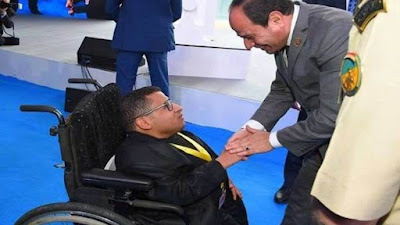According to Egypt’s Central Agency for Public Mobilization and Statistics (CAPMS), about 9% of the Egyptian population (more than 10 million people) are persons with disability. The majority of them are men (53%), and the highest rate goes to disabilities barring mobility functions, followed by seeing and hearing disabilities, according to the United Nations Statistics Division of the Department of Economic and Social Affairs. The families of the people with disability are also counted as being indirectly affected by the disability of the family members, which could multiply this number by at least four times.
For decades, this huge percentage of the Egyptian population, who suffer from disability or are indirectly affected by it, used to receive unfair treatment from the state and the society. Bullying the people with disability was a common practice in schools, work places, and even government bureaus. Many families, in both urban and rural cities, dealt with having a family member with disability as a social stigma and a source of shame, that they had to hide from their neighbors and community.
On the state level, things were even worse. The citizens with disability were usually viewed as a problem that created a burden that the government could hardly handle. The only legislation that dealt with the rights of the people with disability was the Rehabilitation Law no. 39/1975, issued under President Sadat. The law provided a minimal pension to elders with disability and a quota of 2% for disabled workers at companies with more than 50 employees. In 1982, under President Mubarak, the Rehabilitation Law was amended to Law no. 49/1982 that merely increased the workers quota to 5% and extended it to employees at civil service. Other than that, there were no legislations or sincere state initiatives to empower the persons with disability.
Only when President El-Sisi came to power, in 2014, he announced that protecting and empowering the citizens with disability is central to his social policy. Only then, the huge percentage of Egyptians who suffer from disability started to be seen as a national wealth, rather than a burden. El-Sisi’s policy came to activate the stipulations of the 2014 constitution that commit the state to protect and support the rights of the persons with disability.
“The State shall guarantee the health, economic, social, cultural, entertainment, sporting and educational rights of persons with disabilities strive to provide them with job opportunities, allocate a percentage of job opportunities to them, and adapt public facilities and their surrounding environment to their special needs. The State shall also ensure their exercise of all political rights and integration with other citizens in compliance with the principles of equality, justice and equal opportunities.” – Article 81 of the Egyptian Constitution of 2014.
In 2018, President El-Sisi approved the first Egyptian law to be passed by the parliament specifically on the Rights of Persons with Disabilities; Law no. 10/2018, that is drafted in compliance to the stipulations of the Egyptian constitution and the United Nations Convention on the Rights of Persons with Disability (CRPD), on which Egypt is a signatory since 2008. On the same year, Egypt’s first National Council for Persons with Disability was founded to replace the former dysfunctional body of the National Council for Disability Affairs.
Since then, the state has been very careful to include the persons with disability in all fields and activities, including in government offices, and to encourage business owners and employers of all sizes to do the same. President El-Sisi, personally, took several role model initiatives to empower people with disability and to end the social stigma affecting their families. Thanks to these initiatives, today we are seeing people with disability presenting TV shows, working as journalists, acting as members of parliament, collecting medals in various sports games, and even providing inspiring life coaching classes to the public.
One of the interesting statistics that shows how big is Egypt’s progress on enhancing the rights of persons with disability comes from the World Analysis Policy Center, which noted that Egypt is one of only 32 countries, worldwide, that has got active constitutional legislations that protect the persons with disability and guarantee their rights in all life areas, including in political representation. The 32 countries do not include democratically advanced states like the United States of America, where 61 million adults (about 18% of the population) suffer from disability, or France where persons with disability represent 17% of the population (12 million citizens).
